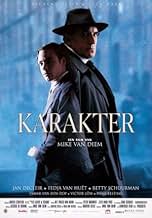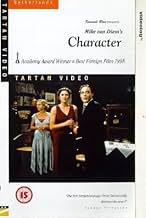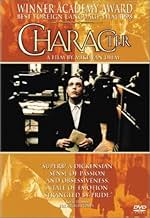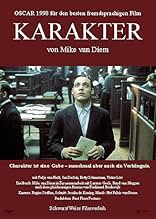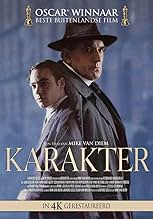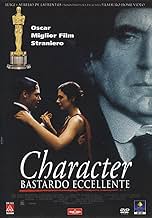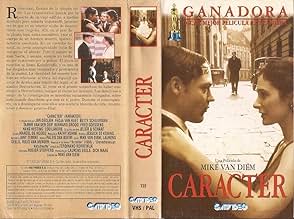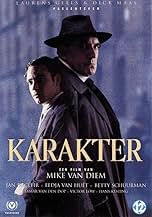CALIFICACIÓN DE IMDb
7.7/10
12 k
TU CALIFICACIÓN
Jacob Katadreuffe vive mudo con su madre, no tiene contacto con su padre que solo está en su contra y quiere convertirse en abogado, a toda costa.Jacob Katadreuffe vive mudo con su madre, no tiene contacto con su padre que solo está en su contra y quiere convertirse en abogado, a toda costa.Jacob Katadreuffe vive mudo con su madre, no tiene contacto con su padre que solo está en su contra y quiere convertirse en abogado, a toda costa.
- Dirección
- Guionistas
- Elenco
- Ganó 1 premio Óscar
- 18 premios ganados y 7 nominaciones en total
Opiniones destacadas
It's no wonder that this Dutch drama got the 1997 Academy Award for the best foreign country movie in the year of "Titanic". It tells the rise-and-fall-story of a young man in the Netherlands of the 1920's who's working hard to escape from the ghetto and to become an idealistic lawyer. Unfortunately his brutal an tyrannic father fights against him in any possible way, and at the end father and son are facing in a hard fight for life and death.
The story is great, the characters (sic!) of the plot even more, and the acting is pure adrenaline-driven. The whole atmosphere, supported by the dark filming locations of Amsterdam, Belgium, Germany (the Speicherstadt in Hamburg) and Poland, is disturbing and depressing. A great psycho drama and insight into the human psyche with a powerful performance by Jan Decleir as villain Dreverhaven that can easily compete with Anthony Hopkins' Hannibal Lecter movies!
The story is great, the characters (sic!) of the plot even more, and the acting is pure adrenaline-driven. The whole atmosphere, supported by the dark filming locations of Amsterdam, Belgium, Germany (the Speicherstadt in Hamburg) and Poland, is disturbing and depressing. A great psycho drama and insight into the human psyche with a powerful performance by Jan Decleir as villain Dreverhaven that can easily compete with Anthony Hopkins' Hannibal Lecter movies!
It is not too frequent that we get Dutch programmes of films or TV-minis in this corner of Europe, and when they do appear it is thanks to the regional Basque TV Station `EITB'. Indeed over two years has passed since seeing the excellent mini `Charlotte Sophie Bentinck' (1996) (qv) and seeing the very interesting `Karakter' recently.
Set in the 1920's this film has excellent mise-en-scéne wonderfully photographed, mostly in Holland and Belgium, but with some scenes shot in Wroclaw, Poland, with street-cars of the times, in which the darkened almost greyish brickwork of the tenement buildings and the industrial port areas takes on an intense protagonism in the film's development. Palais van Boem's musical contribution is mostly just right, though at times seemed to be a little boorish.
A young, illegitimate boy grows up with his unmarried mother, whilst the father, Dreverhaven, continuously appeals to her to marry him, but always rejected. However, the father seems to do everything possible to disrupt the young man's life, as his mother becomes more and more detached and uncaring. It would seem that Dreverhaven is playing out a real-life game of chess around his son Jacob, as if trying to corner him into submission and apathy, but which the young man manages to survive. The psychological impression is that one or the other would undo his `bitter foe', but that despite the father's vast fortune and power the struggle of will would rebound against him.But as the Dutch saying goes: De één zijn dood, is de ander zijn brood'
This is no `thriller' in the ordinary sense, more a psychological suspense which requires attention throughout. The acting is magnificent: both Fedja van Huêt and Jan Decleir play out their parts with just the right touch, especially Decleir, and Lou Landré as Rentenstein is almost spellbinding, not to be missed.
Here is another example of the unarguable fact: here in Europe we make cinema, not blockbuster box-office hits.
Set in the 1920's this film has excellent mise-en-scéne wonderfully photographed, mostly in Holland and Belgium, but with some scenes shot in Wroclaw, Poland, with street-cars of the times, in which the darkened almost greyish brickwork of the tenement buildings and the industrial port areas takes on an intense protagonism in the film's development. Palais van Boem's musical contribution is mostly just right, though at times seemed to be a little boorish.
A young, illegitimate boy grows up with his unmarried mother, whilst the father, Dreverhaven, continuously appeals to her to marry him, but always rejected. However, the father seems to do everything possible to disrupt the young man's life, as his mother becomes more and more detached and uncaring. It would seem that Dreverhaven is playing out a real-life game of chess around his son Jacob, as if trying to corner him into submission and apathy, but which the young man manages to survive. The psychological impression is that one or the other would undo his `bitter foe', but that despite the father's vast fortune and power the struggle of will would rebound against him.But as the Dutch saying goes: De één zijn dood, is de ander zijn brood'
This is no `thriller' in the ordinary sense, more a psychological suspense which requires attention throughout. The acting is magnificent: both Fedja van Huêt and Jan Decleir play out their parts with just the right touch, especially Decleir, and Lou Landré as Rentenstein is almost spellbinding, not to be missed.
Here is another example of the unarguable fact: here in Europe we make cinema, not blockbuster box-office hits.
is a real shame that this kind of movies have to be discovered 3 or 4 years since the release (most dont find their way to theaters) i know that people in the entertainment business are in just for the sake of money, but if they dont want to invest in producing quality movies (books,music etc) at least have to be more open in let these great movies have a decent distribution in the states.
Many people describe the movie as distant and cold. But that's exactly what the makers were aiming for to stay congruent with the 2 novels of Bordewijk where Karakter / Character is based upon. Bordewijk's style is often described as Nieuwe Zakelijkheid (best translation: New Objectivity, think Sinclair Lewis), a counter movement to the upcoming Expressionism in the 20s of the last century. Instead of the idealism of Expressionists more emphasis was put on reality, objectivity and facts in a sober and distant form with little room for frivolity, superficial beauty, sentimentality or explaining behavior. Not only does the style of the novels reflect this, the world the characters inhabit has the same characteristics. Viewed from this standpoint they made an amazing adaptation from a novel, correct in both style and content. But the movie defines more than an art movement, because the characters portrayed tell a lot about the Dutch in general, and this in a way also defines Dutch national identity.
The story itself is about perseverance. Jacob is the son of a relation without love. His parents never marry, the mother leaves soon after she finds out she is pregnant. His mother is stubborn, his father a man without compassion working as a bailiff. Both parents push their son in their own way, his mother almost drives him out of her home, his father lends him money thus starting a battle over the upper hand in their relationship. The father brings adversity to his son in the hope to make him stronger. In line with the style of the novel none of the characters ever experience love. In fact the whole movie contains not one passionate scene. The only character showing emotion (De Gankelaar, an excellent role played by Victor Löw) leaves the country. It has a Nietzschian philosophical angle with the debate of lightness and weight: Jacob's burdens give his life a meaning, but are the sacrifices worth it?
Location scouts did a wonderful job here, because Karakter recreates pre-war Rotterdam, a city almost totally flattened by the Nazis (There is a harrowing photo of the city after the bombardments with only the main church still standing). The production and art departments made the sets with their darkish colors fitting the form and content of the movie. The camera is used in a way to create some fluidity in the scenes: It almost never is static as with so many character dramas.
Fedja van Huêt as Jacob and Jan Decleir as Dreverhaven seem to understand what's going on here and act accordingly. Tamar van den Dop as Lorna is probably the greatest weakness in the movie, with a terrible diction and limited body movement she's miscast here.
Mike van Diem makes only one movie, wins an Oscar, and disappears almost from the earth. Although rumor has it he does some script doctoring in Hollywood, with his current production rate he will surpass even Malick. As for now, this is by far the best Dutch movie ever made.
The story itself is about perseverance. Jacob is the son of a relation without love. His parents never marry, the mother leaves soon after she finds out she is pregnant. His mother is stubborn, his father a man without compassion working as a bailiff. Both parents push their son in their own way, his mother almost drives him out of her home, his father lends him money thus starting a battle over the upper hand in their relationship. The father brings adversity to his son in the hope to make him stronger. In line with the style of the novel none of the characters ever experience love. In fact the whole movie contains not one passionate scene. The only character showing emotion (De Gankelaar, an excellent role played by Victor Löw) leaves the country. It has a Nietzschian philosophical angle with the debate of lightness and weight: Jacob's burdens give his life a meaning, but are the sacrifices worth it?
Location scouts did a wonderful job here, because Karakter recreates pre-war Rotterdam, a city almost totally flattened by the Nazis (There is a harrowing photo of the city after the bombardments with only the main church still standing). The production and art departments made the sets with their darkish colors fitting the form and content of the movie. The camera is used in a way to create some fluidity in the scenes: It almost never is static as with so many character dramas.
Fedja van Huêt as Jacob and Jan Decleir as Dreverhaven seem to understand what's going on here and act accordingly. Tamar van den Dop as Lorna is probably the greatest weakness in the movie, with a terrible diction and limited body movement she's miscast here.
Mike van Diem makes only one movie, wins an Oscar, and disappears almost from the earth. Although rumor has it he does some script doctoring in Hollywood, with his current production rate he will surpass even Malick. As for now, this is by far the best Dutch movie ever made.
How is it possible for a boy, whose parents are devoid of normal humanity, to grow up to be loved and respected? The film, Character, presents a credible demonstration. It has the darkness of Ingmar Bergman or Charles Dickens, is slow-moving, thoroughly engrossing and it left me emotionally drained, which always elicits a high rating from me.
Dreverhaven is apparently an evil man: a bailiff who is quite willing to evict people in a terrible storm. He embodies two Nietzschean concepts: 1.
the will to power (he entered into power struggles with anyone whom he felt he could dominate) and 2. that a life becomes better by becoming stronger through adversity (he did everything in his power to bring adversity to his son, believing that that would strengthen him--and in many ways it did). His internal struggle between the will to power over his son and his desire to strengthen him is the prime mover of the film; his son's reactions to that are the core. Dreverhaven is also totally fearless; the question arises whether it is caused by bravery or just being tired of life.
The film opens with his son, Jacob Katadreuffe (Fedja van Huêt), coming home, all bloody, only to be arrested as a suspect in the murder of Dreverhaven. He then tells the two interrogators a most amazing story. Since he is describing his own life, one might suspect that he is embellishing the story in his own favour but I believe that he was totally candid.
The story is too complex to dwell on but certain aspects must be mentioned. Jacob's mother, Joba (Betty Schuurman), was a servant to Dreverhaven. On one and only one occasion he may have raped her: it is not made clear if she resisted. As soon as she discovered that she was pregnant, she left him and tried to sever all ties. For a long time, however, Dreverhaven repeatedly proposed marriage and was refused. His motivation is ambiguous (propriety or affection) and Joba was apparently determined not to allow Dreverhaven to beat her in a power struggle.
Because of his Mother's silence, young Jacob believed that she did not like him and, being a pariah because he was illegitimate, he turned to books for solace. Through this he developed a love of learning and a willingness to work hard and he advanced rapidly in a law firm, winning the respect and admiration of most of his colleagues, especially De Gankelaar (Victor Löw), who hired him. De Gankelaar, a man with a huge underbite and a heart to match, became Jacob's mentor, adviser and protector.
Denied access to his son, Dreverhaven began a game of terror against Jacob through legal channels.
The film is a study of character and characters. Their motivations are subtly hidden by consistent and superb acting. In my attempts to understand this dysfunctional family (if it can be called a family) I was forced to think. The slow movement allowed time for that. I want to see the film again, expecting that each viewing will bring a closer understanding. Even the evil Dreverhaven was more an object of pity rather than despicable; his actions were caused more by ignorance of human sensitivities, a dogmatic respect for the law and an unusual philosophy rather than by malice. The film is open-ended. What will Jacob do with the rest of his life?
Dreverhaven is apparently an evil man: a bailiff who is quite willing to evict people in a terrible storm. He embodies two Nietzschean concepts: 1.
the will to power (he entered into power struggles with anyone whom he felt he could dominate) and 2. that a life becomes better by becoming stronger through adversity (he did everything in his power to bring adversity to his son, believing that that would strengthen him--and in many ways it did). His internal struggle between the will to power over his son and his desire to strengthen him is the prime mover of the film; his son's reactions to that are the core. Dreverhaven is also totally fearless; the question arises whether it is caused by bravery or just being tired of life.
The film opens with his son, Jacob Katadreuffe (Fedja van Huêt), coming home, all bloody, only to be arrested as a suspect in the murder of Dreverhaven. He then tells the two interrogators a most amazing story. Since he is describing his own life, one might suspect that he is embellishing the story in his own favour but I believe that he was totally candid.
The story is too complex to dwell on but certain aspects must be mentioned. Jacob's mother, Joba (Betty Schuurman), was a servant to Dreverhaven. On one and only one occasion he may have raped her: it is not made clear if she resisted. As soon as she discovered that she was pregnant, she left him and tried to sever all ties. For a long time, however, Dreverhaven repeatedly proposed marriage and was refused. His motivation is ambiguous (propriety or affection) and Joba was apparently determined not to allow Dreverhaven to beat her in a power struggle.
Because of his Mother's silence, young Jacob believed that she did not like him and, being a pariah because he was illegitimate, he turned to books for solace. Through this he developed a love of learning and a willingness to work hard and he advanced rapidly in a law firm, winning the respect and admiration of most of his colleagues, especially De Gankelaar (Victor Löw), who hired him. De Gankelaar, a man with a huge underbite and a heart to match, became Jacob's mentor, adviser and protector.
Denied access to his son, Dreverhaven began a game of terror against Jacob through legal channels.
The film is a study of character and characters. Their motivations are subtly hidden by consistent and superb acting. In my attempts to understand this dysfunctional family (if it can be called a family) I was forced to think. The slow movement allowed time for that. I want to see the film again, expecting that each viewing will bring a closer understanding. Even the evil Dreverhaven was more an object of pity rather than despicable; his actions were caused more by ignorance of human sensitivities, a dogmatic respect for the law and an unusual philosophy rather than by malice. The film is open-ended. What will Jacob do with the rest of his life?
¿Sabías que…?
- TriviaAlthough the story takes place in the Dutch city of Rotterdam, many scenes were filmed in other cities across The Netherlands and Europe. This was because Rotterdam has very few buildings from this era left following heavy bombing during the Second World War. Filming locations included: Hamburg (Germany), Wroclaw (Poland), Antwerp and Ghent (Belgium) and The Hague (The Netherlands).
- ErroresIn one of the street scenes, you can see an extra in modern outfit and with no headwear on.
- Citas
Joba: Why don't you leave our boy in peace?
Dreverhaven: I'll strangle him for nine-tenths, and the last tenth will make him strong.
Selecciones populares
Inicia sesión para calificar y agrega a la lista de videos para obtener recomendaciones personalizadas
- How long is Character?Con tecnología de Alexa
Detalles
- Fecha de lanzamiento
- Países de origen
- Sitio oficial
- Idiomas
- También se conoce como
- Character
- Locaciones de filmación
- Wroclaw, Baja Silesia, Polonia(Miernicza 27, Wroclaw, Dolnoslaskie, Poland)
- Productoras
- Ver más créditos de la compañía en IMDbPro
Taquilla
- Presupuesto
- USD 4,500,000 (estimado)
- Total en EE. UU. y Canadá
- USD 623,983
- Fin de semana de estreno en EE. UU. y Canadá
- USD 37,268
- 29 mar 1998
- Total a nivel mundial
- USD 623,983
- Tiempo de ejecución2 horas 2 minutos
- Color
- Mezcla de sonido
- Relación de aspecto
- 1.85 : 1
Contribuir a esta página
Sugiere una edición o agrega el contenido que falta

Principales brechas de datos
By what name was Carácter (1997) officially released in India in English?
Responda

